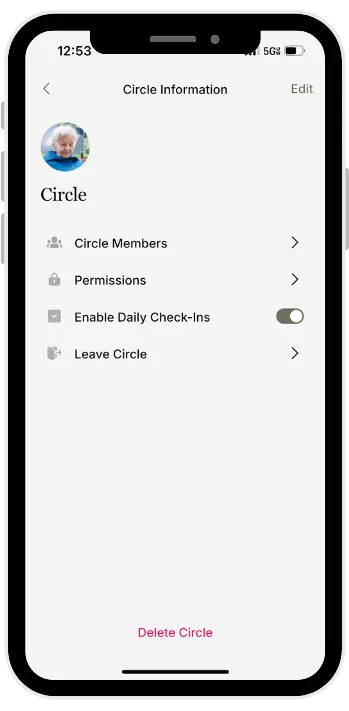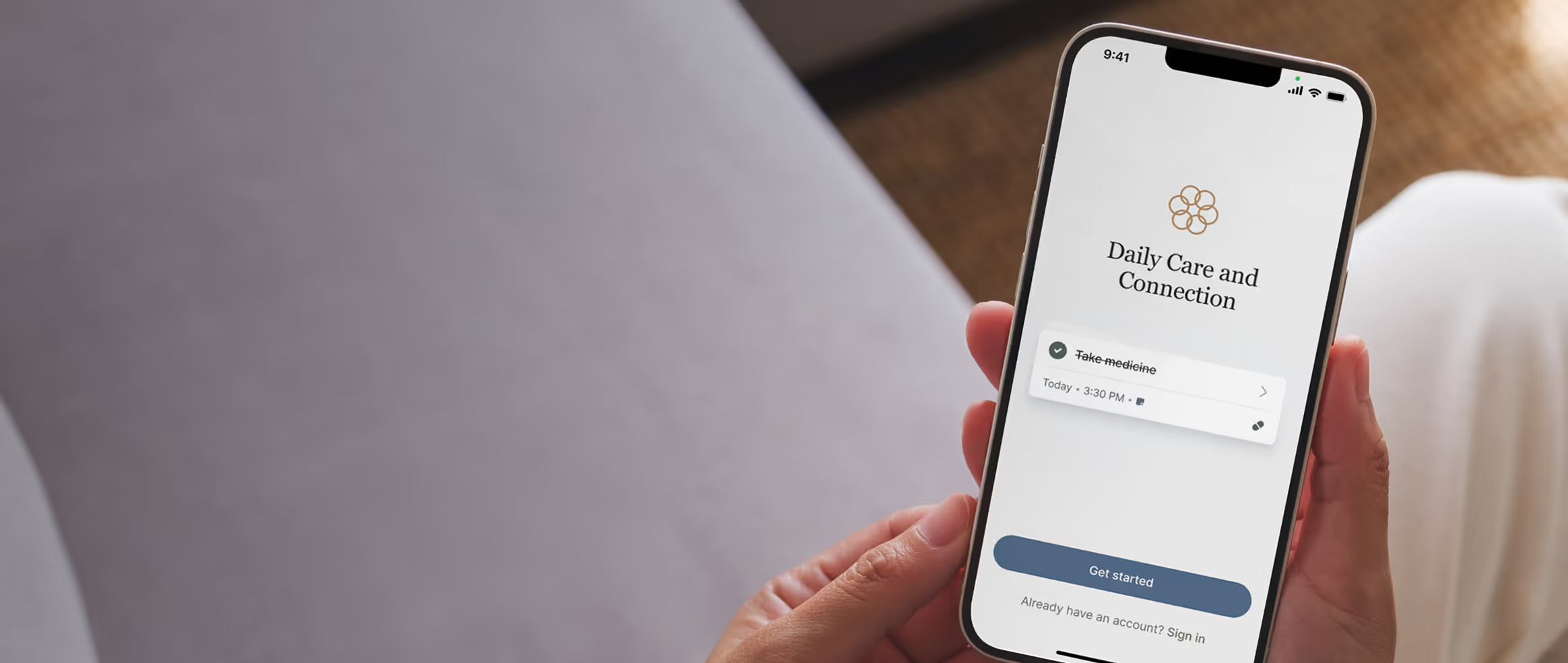Circles of Care: The Power of Team Caregiving

Looking after someone you care about can be both a beautiful gift and a heavy lift. As families take on the increasing responsibility of supporting aging loved ones, individuals with special needs, or those living with chronic conditions, a new model of caregiving is gaining ground: the circles of care approach.
Built around collaboration and shared responsibility, circles of care help prevent burnout, strengthen relationships, and offer more consistent, holistic support. Let’s explore what it means to create a circle of care, how it changes the caregiving experience, and why this method, supported by platforms like Caily, is redefining how we care.
What is a care team?
A care team is a group of people who work together to support someone’s daily well-being, health, and emotional needs. Rather than relying on a single caregiver for a family member, this approach involves multiple contributors who each play a role or are available to help out.
A typical team might include:
- Immediate or extended family members
- Friends or neighbors
- Professional caregivers, nurses, or home health aides
- Therapists, case managers, or physicians
This differs from traditional solo caregiving, where one person, often a spouse, adult child, or close relative, bears the brunt of the work. While this solo effort is admirable, it can be isolating and unsustainable. A circle of care distributes the load, creating a stronger support network for both the care receiver and the caregivers.
The Emotional Toll of Solo Caregiving
According to a study by SHRM, roughly 1 in 2 working caregivers do not share their caregiving responsibilities with anyone else on a consistent basis. Caregiving duties are not only physically demanding but also emotionally and mentally draining. Without a team or tools in place, caregivers may struggle in silence, experiencing exhaustion, guilt, or resentment. Over time, these emotions can evolve into burnout and depression.
Caregivers often hesitate to ask for help. They may feel it's their sole responsibility or worry about burdening others. But this mindset can lead to neglecting their own health, relationships, and needs.
Caregiver Isolation by the Numbers
Research confirms the toll of solo caregiving. According to seniorliving.org, 43% of family caregivers report sleeping difficulties and 36% report feelings of depression. Nearly half (47%) of caregivers receive no formal support, such as financial aid, counseling, or respite care, despite 88% saying they need more help.
A 2023 AARP report finds that more than half of caregivers find that caregiving makes it hard to take care of their own mental health. According to the same report, nearly 4 in 10 caregivers say they never or rarely relax. And 40 percent say caregiving makes them feel alone. The message is clear: caregivers need help. Not just once in a while, but consistently.
Why Team-Based Caregiving Helps Everyone
When caregiving becomes a shared mission, everyone benefits. A well-functioning friends and family circle of care ensures no one person is overwhelmed, and the care receiver receives more attentive and consistent support. This model not only eases the workload but also creates better outcomes for both caregivers and care recipients alike.
Less Burnout, Better Outcomes
Sharing caregiving responsibilities leads to measurable improvements in well-being. When a circle of care is in place:
- Family members are less likely to experience burnout: Research from the National Alliance for Caregiving and AARP shows that 23% of caregivers who feel they don’t have support report their health as “poor” or “fair” compared to only 14% of those with strong support networks.
- There’s more time and space for rest and self-care: The CareSide reports 94% of surveyed caregivers said they often feel physically or mentally exhausted due to their caregiving responsibilities. Caregivers often neglect their own needs and prioritize the needs of others. When someone else helps out with those duties, they can reconnect with themselves and their needs, which in return helps them care better.
- Communication gaps and missed tasks are reduced: Care coordination improves when tasks are delegated and tracked across multiple people, as noted by The Journal of the American Geriatrics Society. Families using structured team-based approaches report better medication adherence, appointment follow-through, and crisis preparedness.
- Loved ones receive more consistent, reliable attention: Multiple caregivers allow for smoother scheduling and continuous support, even when one person is sick, busy, or emotionally taxed. This continuity leads to a safer and more reassuring care environment for the person receiving care.
Emotional Benefits for the Care Receiver
Studies also highlight how care receivers benefit emotionally from having a team around them. They are less likely to feel like a burden when they know that responsibilities are spread out. According to a University of Pittsburgh study on elder care, seniors receiving care from multiple supportive people experienced lower levels of anxiety and higher overall life satisfaction compared to those cared for by a single individual.
In many ways, support for caregivers directly translates into better emotional and physical care for their loved ones. When caregivers are not exhausted, resentful, or overwhelmed, they show up more present, patient, and effective in their roles.
How Caily Embraces the Circles of Care Model
Caily is a caregiving platform designed around the circles of care approach. Recognizing that caregiving should never be a one-person job, Caily helps families create structured, supportive care teams that enhance communication and simplify coordination.
More than a task manager or reminder app, Caily creates a virtual space where every member of the circle of care can access essential information, can easily pitch in, and knows how the care receiver is doing at all times.
Creating a Care Circle with Caily
Building your circle of care on Caily is simple:

- Invite members: You can either create a circle and send a code for people to join, or join an already created circle with a unique code. Here you will add family, friends, and professionals who are part of your support system.
- Define roles: Choose a role for your members as they join: Caregiver or Family and Friends. Then you can assign specific tasks such as meal prep, transportation, bathing, or any other duties.
- Input information: Add important documents, vital signs, routines, professional contacts, and more so the best way to care for your person is clearly defined.
- Create a group chat: Start a conversation with your entire circle, or just a few people, so all care-related messages stay organized in one secure place, instead of getting lost across texts and emails.
This creates a transparent and collaborative space where caregivers feel supported and empowered.
Key Benefits of Caily for Team Caregiving
With Caily, families get access to powerful features built specifically to support circles of care:
- Asking for and receiving help is easier through shared tasks and requests.
- Centralized communication tools keep conversations and updates in one place.
- Shared calendar and scheduling ensure coverage and clarity.
- Health tracking and updates provide insight into mood, symptoms, and appointments.
- Secure Vault for care documents, including medical records, legal forms, and insurance information.
Whether you’re managing a simple routine or navigating complex care needs, Caily keeps your care team organized and connected.
Simple Ways to Support a Caregiver You Know
You don’t have to be part of a formal care team to make a difference. If someone in your life is a caregiver for a family member, offering thoughtful, regular support can ease their burden in meaningful ways.
Here are easy ways to provide support for caregivers:
- Offer to run errands or do a grocery pickup.
- Drop off a home-cooked or freezer meal (see our caregiving meals guide).
- Schedule regular check-ins so they can vent.
- Take over a shift or visit so they can rest.
- Help manage appointments or paperwork.
Even small gestures can reduce stress and remind caregivers they are not alone.
Sign Up for Caily and Start Building Your Circle of Care
The sooner you create your circle of care, the sooner you can experience the relief and clarity that shared caregiving brings. Whether you're just beginning to care for a loved one or already deep into the journey, Caily helps you build a team, distribute responsibilities, and stay connected.
Don’t wait until burnout sets in. Empower your caregiving with tools and support designed for the real challenges families face every day. Sign up for Caily today here.
Frequently Asked Questions About Caregiver Support
How to support a caregiver?
The best way to support a caregiver is to offer consistent, practical help. This might include running errands, preparing meals, or simply listening. Encouraging them to join or create a care team can ease their workload and emotional burden.
What should families looking for private caregivers do?
Families seeking private caregivers should start by identifying their loved one's needs, researching local agencies or independent professionals, checking references, and considering tools like Caily to help coordinate and manage care responsibilities.
What is a care team?
A care team is a group of people who share responsibilities to support someone’s health, well-being, and daily needs. This can include family members, friends, neighbors, and professionals working together to provide care.

Get Started Now
Enjoy full access to everything Caily offers, from medication tracking to shared schedules and daily check-ins. See how much easier caregiving can be when everything is coordinated in one place.
Start your free trial

.jpeg)
%20(1).jpeg)
